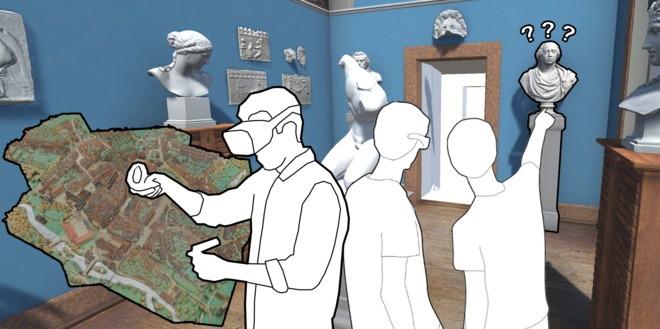Goethe's Legacy - A Virtual Reality Escape Game
Prof. Dr. Bernd Fröhlich
M.Sc. Sebastian Mühlhaus
M.Sc. Ephraim Schott
B.Sc. Tony Jan Zöppig
| Degree | Study Programme | Examination Regulations | ECTS |
|---|---|---|---|
| B.Sc. | Informatik | all | 15 |
| B.Sc. | Medieninformatik | all | 15 |
| M.Sc. | Computer Science for Digital Media | PV18 and lower | 15 |
| M.Sc. | Computer Science for Digital Media | PV20 | 12 |
| M.Sc. | Computer Science and Media | all | 15 |
| M.Sc. | Human-Computer Interaction | PV17 and lower | 15 |
| M.Sc. | Human-Computer Interaction | PV19 | 12/18 |
Motivation
Escape room games convey knowledge in playful environments with an attractive storyline. As part of a Bauhaus.module, a group of students in cooperation with the Klassik Stiftung Weimar and the Gründerzentrum neudeli developed the idea of a digital escape room game set in the Goethe National Museum. In this project we will take this idea into virtual reality and create a multi-user VR escape game using high-fidelity 3D models of the Goethe National Museum. Our investigations will begin by reviewing core mechanics of traditional and digital escape rooms. We will evaluate their benefits and drawbacks in the context of VR and review related literature. Requirements derived from the museum context will guide our user-centered development process, which aims at an effective and enjoyable knowledge transfer based on game mechanics that are easy and fast to learn as well as fun to use. Furthermore, collaboration is an essential aspect of traditional escape room games. Thus, the possibility of collaborative actions and effective means of communication should also be considered.
During the project you will be encouraged to develop your own concepts which you will prototype in Unity. On a regular basis, we will merge the team members’ contributions to realize various prototypes of our collaboratively envisioned „Goethe‘s Legacy“ VR escape game. Our incremental developments and conceptual considerations will regularly be shared and discussed with museum experts at Klassik Stiftung Weimar. Visits to the Gothe Nationalmuseum are therefore also part of this project.
Hardware
You will gain 24/7 access to our well-equipped lab at Schwanseestraße 143. Should pandemic counter measures limit the accessibility of our infrastructure, we will in all cases supply you with state-of-the-art hardware and boost your journey into immersive virtual worlds.
For the duration of the project, each participant will be supplied with an Oculus Quest 2 HMD. If necessary, we will also hand out desktop workstations to meet any additional hardware requirements, which your own machine cannot handle.
Depending on the scope of your contribution, you will be instructed how to integrate and develop for our multi-user stereo projection wall and immersive multi-user multi-touch table.
Apart from deploying your applications using this hardware, we strongly encourage you to explore related VR applications in the wild!
Requirements
As well as willingness to work in a team, and enthusiasm for learning about multi-user VR application development, you should have the following competencies:
- solid programming / scripting skills (C#, C++, Python or similar)
- affinity for VR and games
Additional advantages are experience in:
- Unity3D development
- 3D modelling
- social VR development
If you are in doubt as to whether you fulfil the requirements, or if you have any further questions regarding the project, we are happy to have a discussion with you at the project fair on 10th of October.
Assessment
The final assessment of your work will be conducted based on the project contributions of every team member, including:
- Quality and innovation of your practical results
- Active participation in the project during and in between weekly meetings
- Intermediate and final project presentations
- Documentation
If you believe that playful environments are an effective medium even for serious contexts and would like to explore narrative elements in non-linear interactive virtual spaces - join us!

